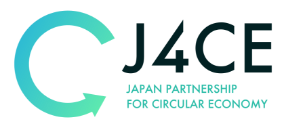The 12th Public-Private Dialogue "Collaborative Actions Between Upstream and Downstream Industries through Digital Technology" was held.
J4CE continues to hold public-private dialogues as a forum for exchanging opinions to further develop a circular economy (CE). Because the evolution of digital technology is an important element for a CE, this 12th dialogue with the theme of "Collaborative Actions Between Upstream and Downstream Industries through Digital Technology" was held online on January 24, 2024. Two experimental cases were presented by the two groups of companies. The first group presented a project where digital technology accurately tracks the flow of resources and costs of recycling small home appliances across the value chain ranging from the use of raw materials to manufacturing, distribution, consumption, collection, and disposal to find a way to develop a sustainable business model. The second group presented a project where an incentive for the next purchase in digital form is provided on a smartphone to shift the consumers' behavior towards environmental performance. Following the two presentations, a panel discussion was taken place. A total of 161 people (excluding organizers) from 75 companies and organizations participated.
【presentation】
- “G7-B7 Workshop on Circular Economy and Resource Efficiency Principles (CEREP) and overview of COP28 and CE Side Event” by the Ministry of the Environment
- "Innovative Technology and Business Model Promotion Project (R5 Tokyo) - Accelerating the recycling of waste plastics derived from small home appliances" by Mitsubishi Electric Corporation, Future Ecology Co., Ltd., Bic Camera Co., Ltd., Veolia Group, and digglue Co., Ltd.
- "Circulation platform 'PLATFORM de owarasenai" by Dentsu Co., Ltd., Dentsu Promotion Plus Co., Ltd., Lawson Co., Ltd., Meiji Co., Ltd., and Nakadai Holdings Co., Ltd.
【Panel Discussion】
The representatives from the companies who are involved in the two experimental projects became panellists and discussed from the perspective of policies that would support coordination and collaboration between upstream and downstream. During the discussion,

